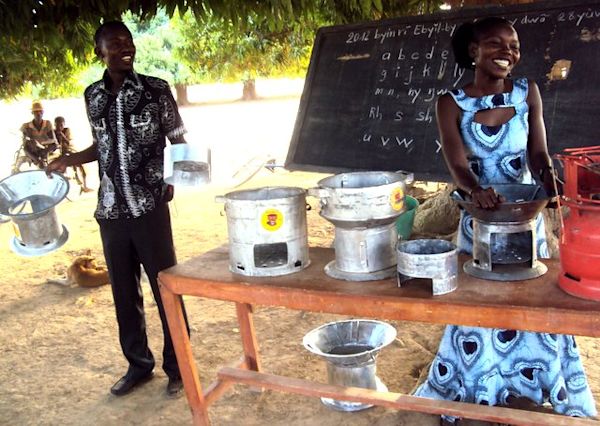
Diana Biggs | KF 18 | Burkina Faso
As mentioned in my previous posts, the Field Partner I’m working with, Entrepreneurs du Monde (EdM), is not a microfinance institution in itself – however, the use of microfinance is key to its mission, as it allows EdM to distribute their socially focused products in a way which can become financially sustainable.
The focus of Kiva’s partnership is EdM’s cookstove project, newly named “Nafa Naana” which can be understood both in Moré and Dioula – the two local languages most spoken in Burkina Faso – roughly translating to “the benefit has come,” “that which you easily win” or “the facility is there.” (Read about it on EdM’s West Africa Blog – and , if you’re really keen, starting picking up some Moré!). Nafa Naana’s mission is to make environmentally-friendly energy products – such as gas and energy efficient stoves – available in Burkina Faso, even to the poorest and most remote households.
Cookstove projects aren’t new to Burkina Faso – both the government and other NGOs have tried to push the population away from using traditional three-stone fires but with limited results. Likely barriers include the perceived higher price of alternative fuels and cooking technologies (due to consumers lack of knowledge), the very limited production and distribution networks for alternative technologies, and the initial investment required (the savings will more than make up for it but most Burkinabe households don’t have the $10-45 upfront required to purchase a stove).
But first, why do away with tradition? In this case, despite the sentimentality we may attach from memories of cooking over a campfire, it’s not hard to see how daily use could hold numerous practical disadvantages:
- Environmental detriment: Wood is the main fuel used by 72% of households in Ouagadougou and nearly 90% of households in the rest of the country, learning to extreme deforestation in an already arid region. The deforestation means urban households have to spend more and rural women need to go further to find food. The burning of the wood leads not only to clouds of smoke in the air but also creates carbon emissions.
- Both women and children spend hours a day collecting wood for cooking and in the actual cooking process (which is typically very slow)
- Since the cooking fire must be outdoors, you’re not able to cook when it’s raining (rainy season here in Burkina is April/May – October and both rain and wind can be very strong)
- The smoke from the fires can cause sore eyes and conjunctivitis, burns and even lead to and respiratory diseases such as pneumonia and emphysemanot
The gas and energy efficient cookstoves either reduce or prevent entirely all of these issues. And, in comparison with cookstove projects tried in the past, several aspects of the Nafa Naana project make it unique, scalable and sustainable – with numerous benefits:
- Removal of financial barriers via microfinance: both retailers operating as social microfranchises and women’s associations who purchase directly benefit from microfinance programs – including Kiva! These will be EdM’s Kiva borrowers!
- Financial benefits at every level of the value chain:
- The stoves are produced by local artisans (in partnership with GIZ FAFASO) who financially benefit from the increase in production
-
- The retail distributors benefit from this additional source of income
- End users, most often women, not only save money on fire wood (for a gas stove user, the savings represent an average of 6,000 FCFA ($12.5 US) per month) but they also save time thanks to faster cooking and less time spent collecting wood
- Availability of products, made accessible through main stores acting as storage and distribution centres for existing retailers in remote areas
- Promotional campaigns to help populations understand the benefits
- Training programs offered at every level of the value chain:
- The artisans who fabricate the stoves receive training in savings, basic entrepreneurship and stock control
- The shopkeepers who choose to retail the stoves receive two days of training in Nafa Naana’s operations and the products and their benefits (live cooking demonstration), the basics of cash and inventory management, sales techniques and awareness of environmental protection
- Women’s groups in turn can attend educational sessions on environmental protection, the benefits of the stoves and directions for use and maintenance
- Environmental benefits: the energy efficient stoves use 40% less wood than the traditional and gas stoves use none
- Nafa Naana is currently applying (in partnership with Carbonium) to register the project to enable the sale of certified emission reductions on the voluntary carbon market, the revenues from which will help to finance the program’s activities
As you can see, the program is very large and with many facets to cover. The four staff directly involved here at EdM Burkina Faso are extremely dedicated and are working very hard to continue to expand the project and build momentum. This week, we went into the field to visit the borrowers to become our first Kiva profiles! I’ll fill you in with how that went and in the preparation, join the Amis des EdM Burkina Faso lending team to get ready to help facilitate the sale of clean energy cookstoves!
Diana Biggs is a Kiva Fellow stationed with Entrepreneurs du Monde in Burkina Faso. Stay tuned for efficient cookstove loans through this Field Partner on kiva.org/lend.
PREVIOUS ARTICLE
In honor of Mandela Day go forth and make a difference →NEXT ARTICLE
Social Performance in Action: Everyone could use a Boost once in a while →


















